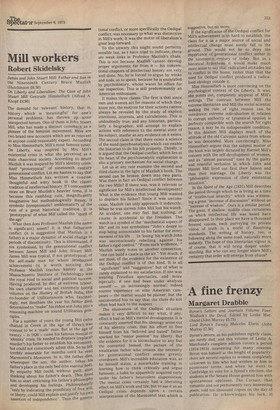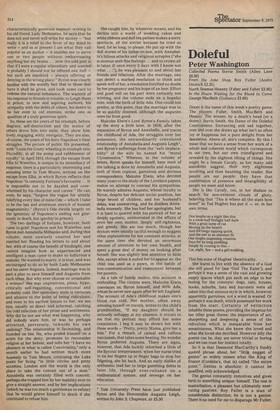A fine frenzy
Margaret Drabble
Byron's Letters and Journals Volume Four: Wedlock's the Devil. Edited by Leslie Marchand (John Murray £5.75) Lord Byron's Family Malcolm Elwin (John Murray £7.50) Byron's letters, as his publishers rightly claim, are rarely dull, and this volume of Leslie A. Marchand's complete edition covers a period (1814-1815) interesting for many reasons. Byron was himself at the height of popularity: there are several replies to women completely unknown to him who had written to him in passionate terms, and when he went to Cambridge to vote for a friend's election,the students in the Senate House greeted him with spontaneous applause. The Corsair, that romantic and not permanently very interesting poem, sold ten thousand copies on the day of publication. He acknowledges his luck, in
characteristically generous manner: writing to his old friend, Lady Melbourne, he says that he does not and never will write for money — "but really it is a relief to the fever of my mind to write — and as at present I am what they call popular as an author — it enables me to serve one or two people without embarrassing anything but my brains ... now the odd part is that if I were a regular stipendiary and wanted it probably I should not be offered one half — but such are mankind — always offering or denying in the wrong place." Byron was clearly familiar with the worldly fact that to those that have it shall be given, and took some care to redress the natural imbalance. The warmth of his response to friends in trouble, to Leigh Hunt. in prison, to new and aspiring authors, his sympathy with the debts of others, his desire to be fair even to old enemies, strike one as qualities of a truly generous spirit.
So, these are the years of his triumph, before disgrace, self-destruction and the malice of others drove him into exile; they show him lively, engaging, witty, energetic. They are also, of course, the years of his hero Napoleon's final struggles. The picture of public life presented, with "Louis the Gouty wheeling in triumph into Piccadilly, in all the pomp and rabblement of royalty" in April 1814, through the escape from Elba to Waterloo, is unique in its immediacy of response; there is a particularly interesting and amusing letter to Tom Moore,_ written on the escape from Elba, in which Byron reflects that Napoleon "is certainly Fortune's favourite. It is impossible not to be dazzled and overwhelmed by his character and career." He can even; he says, "forgive the rogue for utterly falsifying every line of mine Ode — which I take to be the last and uttermost stretch of human magnanimity." (Byron's Ode dwells largely on the ignominy of Napoleon's ending not gloriously in death, but ignobly in prison).
The two darlings of fortune, however, both came to grief: Napoleon met his Waterloo, and Byron met Annabelle Milbanke and, during this volume, most unwisely courted her and married her. Reading his letters to and about her, With of course the benefit of hindsight, one cannot imagine how so experienced and intelligent a man came to make so ludicrous a mistake. He wanted to marry, it is true, and was encouraged to do so by both Lady Melbourne and his sister Augusta. Indeed, marriage was in part a plan to save himself and Augusta from each other. But why ever choose so unsuitable a wciman? She was ungenerous, pious, hypocrititally self-regarding, conventional and probably cold. Her epistolary style is tortuous and 'allusive to the point of being ridiculous, and even in his earliest letters to her, we see him, usually so direct and informal, catching• the cold infection of her prose and sentiments. Why did he not see what was happening, why did nobody warn him, or was he perhaps attracted, perversely, towards his own undoing? The relationship is facinating, and founded on lies. He, who prided himself on a scorn for the deity, promises to reconsider religion at her behest, and tells her "I have no pleMure in what is called Conviviality," only a month earlier he had written much more honestly to Tom Moore, criticising the Lake poets for living "in little circles and petty societies. London and the world is the only place to take the conceit out of a man." Annabelle was certainly filled with conceit: perhaps she trapped him by her inability ever to gives straight answer, and by her implications (which he was too much a gentleman to refute) that he would grieve himself to death if she continued to refuse him.
She caught him, by whatever means, and his decline into a world of wedding cakes and white ribbons and dull tea parties makes a sorry spectacle, all the sorrier because he tried so hard, for so long, to please. He put up with the dull stories of his father-in-law, with Annabella's bilious attacks and religious scruples ("she is overrun with fine feelings ... and to crown all is taken ill once every 3 days with I know not what . . ."), he was pleasant to and about her friends and relations. After the marriage, one can detect a marked resolution to think and speak well of her, a resolution fortified no doubt by her pregnancy and his hope of an heir. Effort and good will on his part were certainly not wanting, and the volume ends on a hopeful note, with the birth of little Ada. One could not predict, at this point, that the marriage was to be so quickly doomed, although the auguries were far from good.
Malcolm Elwin's Lord Byron's Family takes up the story a little later, in 1816, after the separation of Byron and Annabelle, and traces the childhood of Ada, the struggles over her possession, the extraordinarily convoluted relationship of Annabelle and Augusta Leigh*, and Byron's sufferings from the "safe implacability" of the wife he named his "moral Clytemnestra." Whereas, in the volume of letters, Byron speaks for himself, here most of the talking is done by Annabelle and Augusta, both of them copious, garrulous and devious correspondents. Malcolm Elwin, who devoted many years to the study of the Lovelace papers, makes no attempt to conceal his sympathies. He warmly admires Augusta, whose loyalty to Byron, despite her delicate social position, her large brood of children, and her husband's debts, was unswerving, and he dislikes Annabelle intensely. She has had her apologists, but it is hard to quarrel with his portrait of her as deeply egotistic, uninterested in the affairs of even her own mother, deeply self-righteous, and greedy. She ate too much, though her doctors were usually tactful enough to suggest other explanations for her constant attacks; at the same time she devoted an enormous amount of attention to her own health, and spent a great deal of money on looking after herself. She was slightly less attentive to little Ada, except when it suited her to appear so: the child was used as a pawn, in the battle of non-communication and resentment between her parents.
As a tale of family malice, this account is enthralling. The victims were, Malcolm Elwin convinces us, Byron himself, and little Ada, whom he never saw again after he left England. The account of Ada's childhood makes one's blood run cold. Her mother, often away amusing herself on travels, writes to the child's grandmother, "If my daughter should be seriously unhappy at my absence, it occurs to me that my portrait may afford her some consolation. I beg it may be shown her with these words — 'Pretty, pretty Mama, give her a kiss." For a remark of casual and callous narcissism, that takes some beating. No wonder Byron preferred Augusta. There are signs, however, that Ada luckily inherited a little of the Byronic temperament; when her nurse tried to tie her fingers up in finger bags to stop her fidgeting, she bit back. And an early dislike of arithmetic lead her to large gambling debts in later life, through over-reliance on 'a mathematical system, and revenge on her education.
* Yale University Press have just published Byron and the Honourable Augusta Leigh, written by John S. Chapman, at £5.50.



































 Previous page
Previous page